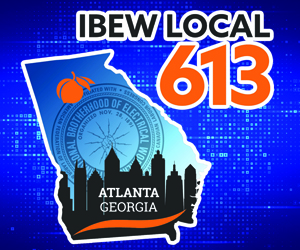Southwest DeKalb’s head football coach Buck Godfrey is comfortable with his life as a coach. In fact, coaching has been a part of every phase of his life for nearly 50 years. Born in April of 1943 in Charleston, S.C., the 65-year-old Godfrey is the oldest of four sons. He graduated from Burke High School, where he played football and baseball and earned scholarships in both sports to Delaware State. The Hornet baseball team won the CIAA Championship in three of Godfrey’s four years. An English major in college, he would eventually get into teaching and get his Master’s Degree from Atlanta University. One of his teachers there, Lucy Grigsby, was a former pupil of W.E.B. Du Bois.
“I had a great time,” Godfrey says. “I had some great teachers, probably some of the best teachers in America.”
His first coaching job came in 1974 as the B-team football coach and head baseball coach at DeKalb County’s old Gordon High School (now McNair Middle School). His baseball team went 26-4 in his second year. “Baseball is nothing but fundamentals, says Godfrey. “Hitting the cutoff man, learning how to bunt, learning the mental parts of the game, […] we practiced that daily and we won with it.”
He later coached at Towers from 1976-1982. Godfrey says it was not his choice to leave Gordon or Towers. He speculates that the reason he was not allowed to stay at either of those schools had something to do with him being an African-American during integration. “Back in those days I guess we won too many games, because I found myself at another school,” he says.
However, he did land on his feet after leaving Towers, becoming the head football coach at Southwest DeKalb. There he became the leader of a program that had won a state championship 11 years prior, so expectations were high. As the first African-American head coach at Southwest DeKalb, he once again ran into problems concerning integration. “People were integrating,” Godfrey says. “Some people were running and some people were staying, so it was kind of tough.”
The Panthers started Godfrey’s first season 1-2-1 before heading into their bye week. That is when what he considers the turning point in the program took place. “To hear my players tell it, I went crazy,” Godfrey says. “We had them hitting trees, just working mental toughness. They just weren’t tough.”
TURNING IT AROUND
Southwest DeKalb finished 10-3-1 that year and the program did not look back. In Godfrey’s 25 years, the Panthers have averaged 9.3 wins a season, and one of those wins was a state championship back in 1995. They became known by many to be the big bad football bully in DeKalb County, but Godfrey sees the success of his program differently: He believes they have overachieved.
“In 1990 we were a double-A school, but we played in quad-A,” Godfrey says. “People don’t know that.”
He also says that when the school played in the newly formed 5A classification that they were actually a 3A school. Now they are in 4A, and Godfrey believes they now have an enrollment of a 4A school, however.
Not only have the Panthers been short in numbers, at times they have been short in size. But Godfrey loves those teams as much as any.
“Some of the best players that ever came through were the smallest players,” he says. “I can remember in 1988, we had one guy [on the team] that weighed over 200 pounds and that little old team went to the quarterfinals.”
Southwest DeKalb only had 660 boys enrolled in school during the 1988-89 school year. Their players and numbers have been at times small, but that has not stopped the program from turning out amazing talent. Godfrey has seen 236 of his players earn college scholarships, and at least eight of those players have gone on to play in the NFL.
The most famous alum is certainly former Georgia Bulldog and Dallas Cowboy quarterback Quincy Carter. When Carter’s name is brought up, Godfrey seems to express a feeling of regret, seemingly thinking about what could have been. The drug problems that cost Carter his starting job for the Cowboys and precipitated his departure from the NFL are well known, but Godfrey specifically laments Carter’s time at Southwest DeKalb when he says that Carter’s family was overprotective of him.
“He had great talent, but he was coddled,” Godfrey said. “He made a lot of growth when we were allowed to get into his life, but for the most part we were not allowed into his life. He’s one of the few guys I never took fishing with me.”
Godfrey says he’s only seen Carter once since he graduated from high school in 1995.
MAKING AN IMPACT
Some of the lesser known players that have stood out to Godfrey over the years are quarterback Eric Johnson, running back Lewis Jackson and defensive end Clifton Williams. But he points to the Panthers’ kicking game as the unit on his teams that he is most proud of. Punter Rodney Williams and kicker Cedric Oglesby represent two of the Panthers that have played in the NFL. Also, David Hensley, Jimmy Bethea and Godfrey’s son, Colin Godfrey, were exceptional in the kicking game. Colin went on to become a three-time All American at Tennessee State.
“The year he won the I-AA [punting] title, he had 58 punts for a 45.86 average, no blocks,” Godfrey said. That is still the single-season record for punting average at TSU, but Colin is not the only one of Godfrey’s children he has seen go on to achieve big things in sports. His daughter, Rashan Ali, is most widely known as the host of 107.9’s A-Team Morning Show and as a sideline reporter for the Atlanta Hawks. Not surprisingly, as with Colin, Godfrey coached her and helped her get an athletic scholarship as well. Her sport was swimming, however, and her accomplishments and those of her youth-league swim team, the Worthington Valley Dolphins, which Godfrey started, remains Godfrey’s proudest moment in coaching. “I had four girls who still own records in the DeKalb County League,” Godfrey said. “Those four girls gave me more joy than the state championship because they won the age-group trophy for six years in a row, which was unheard of.”
All four, Tamanika Haven (Howard), Sherlonda Pitts (Georgia Southern), Angela Wilborn (Florida A&M) and daughter Rashan (Florida A&M), earned swimming scholarships. Whether it is his kids or other kids, Godfrey has sincerely invested his time into the lives of young people. To do this, he says that a coach must be sensitive to the needs of kids. “Eddie Robinson [said] you’ve got to love ‘em to coach ‘em,” Godfrey says.
To love them is important, but Godfrey also says you have to be tough on them as well. “You prepare them to be so hard until nothing in this life can hurt them,” he states. “You put a toughness in them that they’ll never lose.”
His approach has helped build productive members of society. Of the 236 kids he has sent off to college on football scholarships, 179 have earned their degree thus far. “Winning is not the scoreboard,” Godfrey says. “Winning is seeing your kids come back as teachers and principals. That’s what winning is.”
Much of Godfrey’s sensitivity in dealing with kids comes from the hurt and injustice he has experienced in his life. One event in particular occurred during his upbringing in Charleston and is chronicled in his book, The Team Nobody Would Play. Godfrey was a part of an undefeated Little League team in 1955, which was made up of all black players. White teams refused to play them, thus eliminating their chances of winning the Little League World Series. They were named the undeclared champions of South Carolina, but were not allowed to compete for a chance to go to Williamsport. Most of Godfrey’s teammates were so heartbroken that they never played baseball again after that season. “That’s the interesting part of that book. How that slight affected them for the rest of their lives,” Godfrey said.
THE PRESENT AND FUTURE
In this day and age of high-school sports, Godfrey does not like how some of today’s coaches are dealing with kids. “Guys move from one job to the next. They call it pressure, they call it wanting to be with their families, they call it ‘we don’t have any talent,’” Godfrey said. “They don’t understand that’s life.”
The veteran Panther head coach loves stability, and because of that he is a big fan of longtime Lincoln County head coach Larry Campbell. “He doesn’t complain or anything, he just takes what he’s got at that [Class] A school down there and wins,” Godfrey said. “If you jump around like a butterfly from flower to flower and win a championship here and a championship there, what is your legacy? What do kids say about their coach?”
Godfrey also is aware of the presence of recruiting by high-school coaches. It is something that he says he has seen since he became a head coach, but never has been tempted to do. “I never could recruit, because you make promises [when you recruit] and you can’t do that,” Godfrey says. “You come here because you want to.”
The Southwest DeKalb program hit a bit of a road bump at the start of the decade, even suffering its first losing season under Godfrey in 2002. That team finished 5-6 after losing in the first round of the playoffs, and last year’s team, as well as the 2004 team, finished 5-5, missing the playoffs. There may be whispers that the game has passed Godfrey by, but he looks at his teams’ recent struggles as being a byproduct of having Stephenson and M.L. King come into existence within the last 12 years and take students away from Southwest DeKalb.
“The people who plan [the schools], I don’t know what they were planning for. It looks like they were planning for our demise,” Godfrey said. “You don’t build a school four blocks from another school, or four miles, for that matter.”
Despite having a smaller pool of players than earlier in Godfrey’s career and playing in one of Georgia’s toughest regions (Class 4A’s Region 6), Godfrey sees this year as a special one for the Panthers. He loves the character of his current group of players, singling out their achievements in the classroom and on the playing field. “They’ve got a work ethic and love for each other that I haven’t seen in a while,” Godfrey says. “You can get the best athletes in the world and they get [beaten], because they don’t love each other. But, once they love each other, you can’t beat them.”
Looking ahead, he thinks the program is stable. “Right now we have a real solid program. We’re back to where we need to be,” Godfrey said.
As for how long he will continue coaching, Godfrey is a bit less sure: “I told a person very special to me that I had a two-year line.” If he holds to that, a career of over 40 years walking the sidelines in football will come to an end. But the teaching, surely, will never stop.
Butler can be reached at jbutler@scoreatl.com.














































